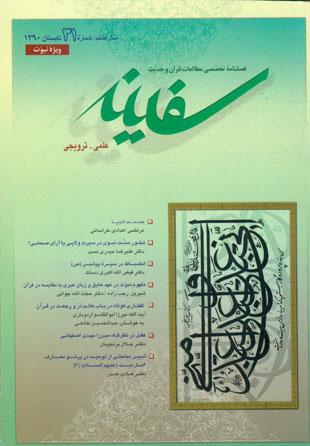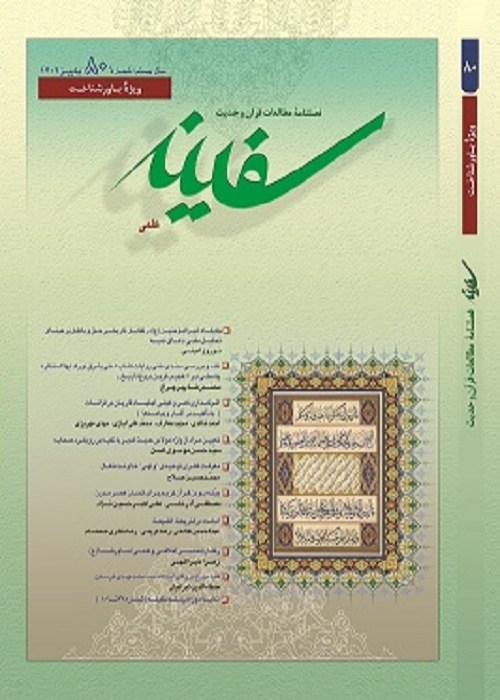فهرست مطالب

نشریه سفینه
پیاپی 31 (تابستان 1390)
- ویژه نبوت
- تاریخ انتشار: 1390/06/20
- تعداد عناوین: 9
-
-
صفحه 5
- مقالات
-
صفحه 10معنای عصمت در لغت و اصطلاح، عوامل عصمت و ضرورت آن براساس آیات و روایات، موضوع این گفتار است. نویسنده به عصمت پیامبران: پرداخته و دیدگاه های محدثان و متکلمان را بررسی می کند. در باب عوامل عصمت، از علم و عقل، اطاعت خداوند، توفیق، طینت و روح القدس یاد می کند.
کلیدواژگان: عصمت، معنی، عصمت، ضرورت، عصمت، عوامل، نبوت، پیامبران، ویژگیها -
صفحه 37سنت، تبیین قرآن و دربردارنده تفصیل آموزه های اسلام است که دستخوش برخی حوادث شده است. لذا دستیابی به سنت نبوی مستلزم تلاش بسیار است. درباره طریق وصول به سنت، گروهی از مسلمانان (شیعه) سیره برخی اصحاب عترت: را احتیاط آمیزترین راه می شمرند؛ اما برخی مسلمانان (اهل تسنن) سنت پیامبر 9 را در رفتار عموم اصحاب جستجو می کنند.
بررسی شخصیت عترت و اصحاب و مقایسه کارنامه شان با هم، به ما کمک می کند درباره اینکه «سیره کدام دسته (عترت یا عموم اصحاب) به صورت هرچه شایسته تری آینه تمام نمای سنت نبوی و تبلور آن است» داوری درست تری داشته باشیم. نیز می بینیم که سیره عترت هماهنگ با هم و همسو با قرآن و سنت است، اما سیره اصحاب، بلکه چه بسا یک صحابی، جز با انواعی از تاویل و توجیه با قرآن و سنت، بلکه با سیره خودش هماهنگ نمی نماید.
کلیدواژگان: سنت، سیره، عترت، اهل بیت:، امامان، اصحاب -
صفحه 72سیاست راهبردی نظم و انضباط در همه ابعاد شخصیت و نیز حیات رسالی پیامبر اعظم را می توان از جمله عوامل و مولفه های اثرگذار بر روند حاکمیت و نیز سیره تبلیغی آن حضرت قلمداد کرد؛ به گونه ای که آن حضرت در تمامی شئون زندگی خویش فردی منضبط، هماهنگ و جدی و با نظم بوده اند.
ابعاد مختلف این نظم و انضباط در سیره و حیات فردی، حیات رسالی و تبلیغی، به ویژه در دوران تشکیل حکومت اسلامی در مدینه و نیز در مدیریت سیاسی و نظامی پیامبر اعظم 9 از جمله مواردی است که نگارنده به بررسی و تبیین و تحلیل آنها می پردازد.
کلیدواژگان: پیامبر اعظم 9، نظم و انضباط، سیره، موفقیت، دعوت جهانی، امور سیاسی -
صفحه 88نبوت از مفاهیمی است که بین ادیان الهی مشترک است. در دو دین آسمانی یهود و اسلام، خداوند فردی را که نبی اوست انتخاب می کند تا پیامش را به مردم برساند و آنان را در مسیر هدایت و کمال قرار دهد. در مقایسه این مفهوم در این دو دین الهی، به وجوه اشتراک و افتراقی برمی خوریم: در هر دو دین، نبی الهی متصف به اوصاف الهی است، نبی الهی برای رسیدن به پیام خداوند از طرق مشابهی بهره می گیرد، در هنگام دریافت وحی الهی، ثقل وحی موجب تغییر احوال او می شود و در هر دو دین، انبیای الهی از مراتب و درجاتی برخوردار هستند.
در عین حال، اختلافاتی نیز مشاهده می شود؛ ازجمله اینکه در دین یهود، علاوه بر مردان در میان زنان نیز نبوت رایج است، انبیای بنی اسرائیل به طور گروهی و دسته جمعی نبوت می کنند و دچار خلسه گروهی می شوند. در عهد عتیق علاوه بر نبوت الهی و راستین بحث نبوت دروغین مشاهده می شود.
کلیدواژگان: قرآن، عهد عتیق، نبوت، نبی، تشابه، افتراق -
صفحه 109نگارنده ضمن طرح پاره ای از مباحث توحید و اسماء و صفات، به جایگاه عقل در فهم آن می پردازد. تبیین معنای اسم و صفت و نقد برخی از نظریات در این مورد، نیز انجام شده است.
کلیدواژگان: توحید، اسماء و صفات، اسم و صفت، معنی، الاسماء الحسنی - نکته پژوهشی
-
صفحه 124حجیت عقل در دیدگاه آیت الله میرزا مهدی اصفهانی (13031365 ق.) در حوزه های مباحث نظری و اصول اعتقادی و مباحث اصول فقه، محور اصلی این گفتار است که براساس نوشته های میرزامهدی اصفهانی تدوین شده است.
میرزا مهدی اصفهانی امور را به دو گونه تقسیم می کند: یکی امور عقلی که هر عاقل، مستقل از دین و آیین، می پذیرد. دوم امور شرعی که عقل هیچ عاقل، بدان دست نمی یابد و ناگزیر، باید از منابع وحی دریافت. نگارنده به نقدهای برخی ناقدان بر دیدگاه میرزامهدی اصفهانی نیز پاسخ می دهد.
کلیدواژگان: اصفهانی، میرزامهدی (1303، 1365 ق، )، عقل، کارکرد، عقل، امور مستقل، شرع و عقل، مکتب معارفی خراسان - اسناد و متون
-
صفحه 175نویسنده به پاره ای از آیات مربوط به عالم ذر و رجعت در قرآن پرداخته، اعتبار احادیث مربوط به آنها را نشان داده، به اشکالهای کسانی که آن آیات و احادیث را انکار یا تاویل کرده اند، پاسخ می گوید. این گفتار، بخشی از کتاب چاپ ناشده «شهاب مبین» نوشته میرزا ابوالقاسم اردوبادی (12741333 ق.) است.
کلیدواژگان: شهاب مبین (کتاب)، اردوبادی، ابوالقاسم (1274، 1333 ق، )، عالم ذر، رجعت، قرآن، اعجاز -
صفحه 193
-
Page 10The subject of this article is the meaning of infallibility in terminology and practice; and the elements and requirements of infallibility according to the holy traditions and the Qur¨anic verses.The writer has discussed the views of the theologists and traditionalists about the "Infalliblity of the Prophets". In this research, he has talked about the elements & aspects of infalliblity, the science andwisdom, obedience of the Almighty. God, His blessings, and the holy Spirit.Keywords: Infalliblity: its meaning, In falliblity: requirements, Infallibility: necessities, reasons, Divine message, the Prophets: Characteristics
-
Page 37The holy Prophet¨s practice and traditions include the interpretation and explanation of the holy Qur¨an, and teachings of Islam. The historical record of that practice is done with some changes and interferences. Therefore, any access to the true practice of the holy Prophet requires a serious effort.In order to discover and gain the Prophet¨s practice, some of the Muslims (the Shia community) have preferred to study and follow the practice and behavior of some of the companions (the distinguished family and progeny of the holy Prophet (p.b.u.t)); while the others - the Sunni community - are searching for the practice of the holy Prophet, in the practices and behaviors of the whole disciples.A detail study of the characteristics of the holy progeny of the prophet, and his companion; and comparing their histories and achievements will help us to judge the words and practices of which group - the infallible progeny of the holy Prophet (p.b.u.t), or his companions as a whole - more correctly and effectively resembles and manifests the practice of the holy Prophet (p.b.u.h)?We will finally see that the practices of the infallible progeny of the holy Prophet are more compatible with each other, and in firm compliance with the holy Qur¨an and the practice of the holy Prophet (p.b.u.h). But the practices of the companions, or different behaviors of a single companion, will not comply with the Quranic standards and the holy traditions, unless we apply unusual justifications.Keywords: Tradition, Behavior, The holy Progeny, The holy family of the Prophet (p.b.u.h), The Imams, The companions
-
Page 72By a study of the private and public aspects of the life of the holy Prophet (p.b.u.h), one comes to the conclusion that order and discipline have been influential factoris in his strategic planning for teaching andstate.Different aspects of order in the private life, in propagation the divine message and Islamic teachings, in political and military managements, and especially at the time of establishment of his government in Medina, are from the points that our writer has discussed in his article.Keywords: The great Prophet (p.b.u.h, h.p.), Order, Discipline, The holy practice, Achievements, Word Invitations, Public affairs
-
Page 88Divine message and prophet hood is a common point about the divine religions. In the 2 religions of Islam and Jewish, the Almighty God chooses and appoints a person as His messenger, in order to deliver His message to the people; and bring them to the Path of guidance and perfection.In a comparative study of this meaning in the 2 Abrahamic religions, we see some similarities and dissimilarities: In both religions:- The divine Prophets enjoy divine characteristics;- At the time of the descending of the divine message, as a result of the dignity of the message, the Prophet(s) receive mental changes.- In both religions, the divine messengers have had spiritual characteristics.At the same time, there are some differences:- In Judaism, there are some women as messengers.- The Prophets of the family of Israel conducted their missions collectively. They also had common revelations.In the Old Testament, besides the true and divine messages, you observe some false and adopted messengers either.Keywords: The Qur¨an, Old Testament, Message, Prophethood, Prohet, Similarity, Dissimilarity
-
Page 109The writer, by discussing some subjects about "the Oneness of God, and His Names and Attributes" explains about the position of Reason and mind in understanding them. He has tried to clarify the exact meanings of the Names & Attributes, and criticize some views in this regard.Keywords: Tawhid, Oneness of God, The Names, Attributes, the meaning, The Good names (Asma al Hosna)
-
Page 124The main point of this article is the authority of Reason in the fields of theoretical, belief principals, and jurisprudence, which is deliberately prepared according to the writings of Mirza Mahdi Esfahani (1303-1365 A.H.)Mirza Mahdi Esfahani has divided the human affairs in to 2 domains:1. The affairs that a wise person, irrespective of his religion, accepts;2. Those religious affairs can not be judged by the human reason; therefore, one should receive it through an inspired and revealed source. The researcher, has also answered some views of the criticals to the viewpoints of thelate Mirza Mahdi Esfahani.Keywords: Esfahani, Mirza Mahdi (1303, 1365 A.H.), Reason: Application


